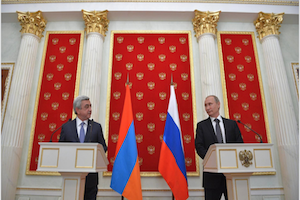Armenia's Revolution and its Lessons
By Stephen Blank
June 4, 2018, the CACI Analyst
On April 23, after almost ten days of mounting popular demonstrations, Serzh Sargsyan resigned as Armenia’s Prime Minister. While public antipathy to him mounted throughout this interval, it appears that the army’s impending disintegration into pro and anti-Sargsyan groups was a decisive factor. Yet sadly but typically the Western media ignored one of this year’s major geopolitical stories – namely Armenia’s developing revolution – until Sargsyan resigned and even then covered it sporadically. Since Armenia and its capital Yerevan are off the beaten track, apparently they do not merit major news coverage. We should not emulate this mistake.
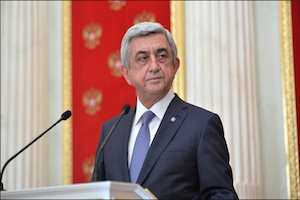
Moscow's Role in Armenia's Revolution
By Emil A. Souleimanov and Anton Barbashin
May 31, 2018, the CACI Analyst
The “Velvet revolution” in Armenia raised concerns about the possibility of a Russian intervention in this South Caucasian republic, for the sake of preventing Russia’s key ally in the region from slipping into “Maidanization” and Armenia escaping Moscow’s foreign political and security orbit. Yet events that unfolded illustrated Moscow’s rather ambiguous attitude toward the country’s bottom-up regime change, something that Russian elites, fearful as they are of Western-inspired “color revolutions”, have otherwise done their best to forestall. The explanation for Moscow’s reception of Armenia’s revolution lies in Russia’s clout in Armenia, the character of the popular demonstrations and the regime, and Nikol Pashinyan’s reassuring stance toward Moscow and its interests throughout his campaign.
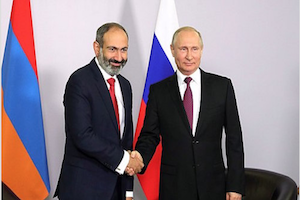
Armenia's Prime Minister Resigns Amid Extensive Protests
By Armen Grigoryan
May 2, 2018, the CACI Analyst
A predictable attempt by Armenia’s former President Serzh Sargsyan to continue ruling the country as prime minister after the transition to a parliamentary system triggered a massive protest campaign. Despite previous experiences of rather unsuccessful protests, often violently suppressed by police, a new protest movement managed to mobilize wide public support. On April 23, six days after his appointment as prime minister, Sargsyan resigned in the face of mass protests and a civil disobedience campaign. The protest actions will likely continue, with demands including the appointment of an opposition representative as the head of a provisional government and snap parliamentary elections.
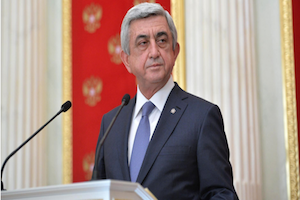
Armenia Elects New President
By Natalia Konarzewska
April 2, 2018, the CACI Analyst
On March 2, Armenia’s National Assembly elected Armen Sargsyan as president. This was the first presidential election in Armenia after the constitutional amendments adopted in 2015, which envisage a shift from a semi-presidential to a parliamentary system of government. The new system limits the president’s role to a ceremonial figure, while allocating more executive power to the prime minister who will be nominated in April when incumbent President Serzh Sargsyan’s (not related) term ends. The new president’s strong foreign policy credentials will expectedly advance Armenia’s interests abroad, which is especially important as the country hopes to rekindle relations with Euro-Atlantic structures.
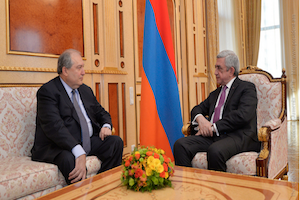
Russian Loan Allows Armenia to Upgrade Military Capabilities
By Eduard Abrahamyan
January 8, 2018, the CACI Analyst
On December 6, 2017, the Armenian Parliament unanimously ratified the Armenian-Russian US$ 100 million “state export loan.” The accord, signed on October 24, allows Yerevan to borrow funds for purchasing a wide range of sophisticated arms manufactured by Russia in order to implement the “Common Defense Sector Development Plan.” This is Moscow’s second programmed military loan to Armenia, following the US$ 200 million loan agreed in 2015 which is now in the final stage of realization. The pending loan is intended to allow Yerevan to uphold its consistent procurement of military hardware since 2011 in an effort to negate Azerbaijan’s military-technical superiority.
